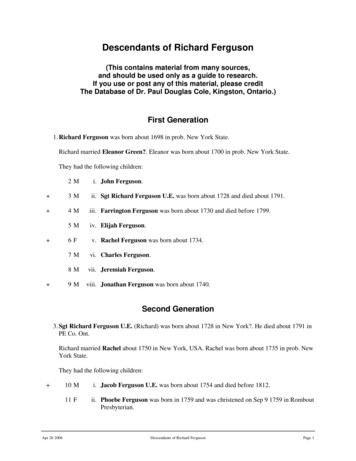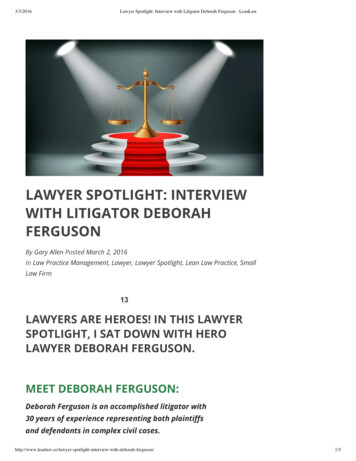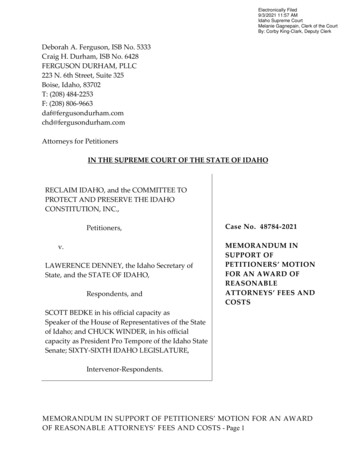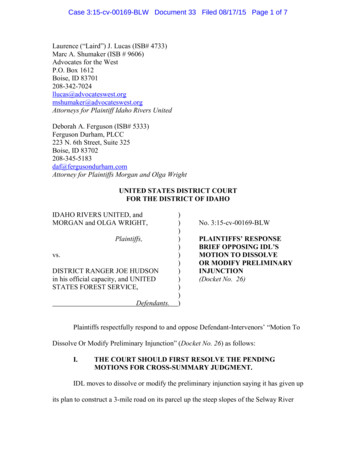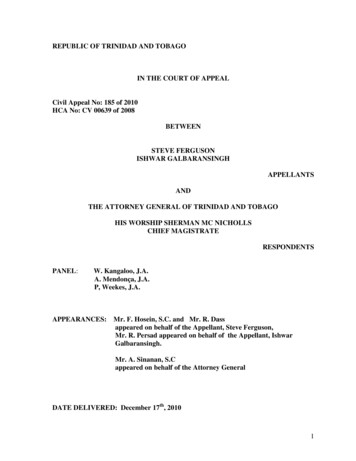
Transcription
REPUBLIC OF TRINIDAD AND TOBAGOIN THE COURT OF APPEALCivil Appeal No: 185 of 2010HCA No: CV 00639 of 2008BETWEENSTEVE FERGUSONISHWAR GALBARANSINGHAPPELLANTSANDTHE ATTORNEY GENERAL OF TRINIDAD AND TOBAGOHIS WORSHIP SHERMAN MC NICHOLLSCHIEF MAGISTRATERESPONDENTSPANEL:W. Kangaloo, J.A.A. Mendonça, J.A.P, Weekes, J.A.APPEARANCES: Mr. F. Hosein, S.C. and Mr. R. Dassappeared on behalf of the Appellant, Steve Ferguson,Mr. R. Persad appeared on behalf of the Appellant, IshwarGalbaransingh.Mr. A. Sinanan, S.Cappeared on behalf of the Attorney GeneralDATE DELIVERED: December 17th, 20101
JUDGMENTDelivered by A. Mendonça, J.A.1.This is an appeal from the judgment of Kokaram J, dismissing the Appellants’ motionwhereby they sought a declaration that certain sections of the Extradition (Commonwealthand Foreign Territories) Act (the Act) infringe their fundamental rights and freedomsguaranteed by sections 4 and 5 of the Constitution.2.The Appellants reside in this country. An extradition request was made by the UnitedStates of America (USA) pursuant to the Act for the extradition of the Appellants to standtrial for a number of offences which arose out of the construction of the Piarco InternationalAirport and include money laundering and wire fraud. On July 14th, 2008 the Appellantswere committed by the then Chief Magistrate (the Second Respondent) to await extraditionto the USA.3.Since the committal of the Appellants by the Chief Magistrate there have beenseveral challenges by the Appellants to the extradition process, which would serve to explainthe reason that they have not been extradited to the USA despite the committal order havingbeen made in 2008. There was first the challenge to the authority to proceed issued by theAttorney General under the Act. This was by way of judicial review proceedings which wereheard before Bereaux J, (as he then was) and were dismissed. The appeal to the Court ofAppeal was also dismissed.4.There were also habeas corpus proceedings which were dismissed on May 6th, 2009and the appeal to the Court of Appeal from that decision was also dismissed. A subsequentapplication to the Privy Council for special leave to appeal from the Court of Appeal’sdecision was refused. More recently, the Attorney General’s order for the return of theAppellants was challenged by way of judicial review proceedings. These proceedings weredismissed. The Appellants have appealed from that decision and in fact that appeal and thisappeal were heard together. The Court’s decision on the appeal from the Attorney General‘s2
decision for the return of the Appellants is the subject of separate judgments.5.By these proceedings the Appellants claim that certain provisions of the Act areunconstitutional. Before the trial Judge they contended that sections 9, 12 and 19A of theAct infringe the fundamental rights enshrined in the Constitution in sections 4(a), (b) and (g)and sections 5(2)(a), (b), (e) and (h). They further argued that section 19A (2)(c) infringedthe principle of equality of arms and that 19A(2)(a) and (b) violate their right to equalitybefore the law. They also contended that sections 3, 4, 6(1)(c), 8(3)(c), 9, 10, 11, 16 and 19A(1)(b) of the Act violate the doctrine of the separation of powers inherent in the Constitution.The Judge rejected these contentions and found that the Act did not offend against theConstitution. Before this Court the Appellants have renewed their challenges. They haveargued that sections 9, 12 and 19A of the Act infringe the fundamental rights provisions thatwere argued before the Judge and also have contended that section 4(c) of the Constitutionhas been infringed by the said provisions of the Act as well. With respect to the separation ofpowers argument, however, they have focused on section 4 of the Act.6.There are therefore four challenges to various provisions of the Act, namely, (1) thatthey infringe the fundamental rights provisions, (2) that they violate the principle of theequality of arms which may be regarded as an aspect of due process and part of thefundamental rights but which I will discuss here separately, (3) that they infringe their rightto equality before the law, which is a fundamental right, but which I will also treat withseparately, and (4) they violate the principle of the separation of powers. It will be best toapproach this judgment by considering each challenge in turn, and I will start with thechallenge to the fundamental rights provisions.7.The rights which are allegedly infringed are essentially, (1) therightnottobedeprived of one’s liberty and security of the person except by due process of law (section4(a)) of the Constitution, (2) the right of the individual to equality before the law andprotection of the law (section 4(b)), and (3) the right of the individual to respect for hisprivate and family life (section 4(c)), and (4) the right to freedom of movement (section4(g)). As I have mentioned it is alleged that these rights are violated by sections 9, 12 and19A of the Act which for convenience I set out hereunder:3
“9.((1)Subject to the provisions of this Act relating to provisionalwarrants, a person shall not be dealt with thereunder except inpursuance of an order of the Attorney General (hereafterreferred to as an authority to proceed), issued in pursuance ofa request made to the Attorney General by or on behalf of theGovernment of the declared Commonwealth territory, or thedeclared foreign territory, in which the person to be returned isaccused or was convicted.(2)There shall be furnished with any request made for thepurposes of this section on behalf of any territory a record ofthe case which shall include (a)in the case of a person accused of an extraditableoffence, a warrant for his arrest issued in that territoryand a document summarizing the evidence available tothat territory for use in the prosecution of the person;(b)in the case of a person unlawfully at large afterconviction of an extraditable offence, a certificate of theconviction and sentence in that territory, and statementof the amount, if any, of that sentence which has beenserved;together in each case with (c)particulars of the person whose return is requested;(3)(d)particulars of the facts upon which and the law underwhich he is accused or was convicted;(e)evidence that provision is made by the law of thatterritory for the specialty rule provided for by section8(3), where the specialty rule is not made by anarrangement with that territory; and(f)evidence sufficient to justify the issue of a warrant forhis arrest under section 10.On receipt of a request made for the purposes of this section onbehalf of any territory, the Attorney General may, in the formset out in Form 1 in the Second Schedule, issue an authority toproceed signifying to a Magistrate that a request has beenmade and requiring him to proceed with the case inaccordance with the provisions of this Act.4
12.(4)The Attorney General may receive supplementary evidence tothe record of the case and re-issue an authority to proceed toreplace one issued under subsection (3) of this subsection atany time before proceedings under section 12 begin, and allprevious documents issued and orders made by the Magistrateapply in respect of a re-issued authority to proceed, unless theMagistrate, on application of the person or the AttorneyGeneral, orders otherwise.(5)Where the Attorney General re-issues an authority to proceedunder subsection (4) and the person applies for another date tobe set for the beginning of proceedings under section 12, inorder to give the person an opportunity to examine the reissued authority to proceed, the Magistrate may set anotherdate for the hearing.(6)The Attorney General may amend the authority to proceedafter the hearing has begun in accordance with the evidencethat is produced during the hearing.(7)The Attorney General may not issue an authority to proceed ormay withdraw one already issued if it appears to him that anorder for the return of the person concerned could not lawfullybe made, or would not in fact be made, in accordance with theprovisions of this Act.(8)Where the Attorney General withdraws an authority to proceedafter proceedings under section 12 have begun, the Magistrateshall discharge the person and set aside any order made withrespect to the remand of the person in custody or on bail.(1)A person arrested in pursuance of a warrant issued undersection 10 and in respect of whom no order under section 11(2)has been made shall [unless previously discharged undersection 10(3)], be brought as soon as practicable before aMagistrate.(2)For the purposes of proceedings under this section aMagistrate shall have the like jurisdiction and powers, asnearly as may be, including power to adjourn the case andmeanwhile to remand the person arrested under the warranteither in custody or on bail, as when the Magistrate is acting ata preliminary enquiry.(3)Where any person is arrested and in custody by virtue of aprovisional warrant but no authority to proceed has beenreceived in respect of him, the Magistrate may fix a reasonable5
period (of which the Magistrate shall give notice to theAttorney General) after which the person will be dischargedfrom custody unless the authority to proceed has been received.(4)Where an authority to proceed has been issued in respect of theperson arrested and the Magistrate is satisfied, after hearingany evidence tendered in support of the request for the returnof that person or on behalf of that person, that the offence towhich the authority to proceed relates is an extraditableoffence and is further satisfied (a)Where the person is accused of the offence, that (i)there is evidence admissible under this Act ofconduct that, had it occurred in Trinidad andTobago, would justify committal for trial inTrinidad and Tobago for the offence set out inthe authority to proceed; and(ii)(b)the person is the person sought by the declaredCommonwealth or foreign territory; orwhere the person is alleged to be unlawfully at largeafter conviction of the offence, that -(i)the conviction was in respect of conduct thatcorresponds to the offence set out in theauthority to proceed;(ii)the person is the person who was convicted; and(iii)the person appears to be unlawfully atlarge,the Magistrate shall, unless his committal is prohibited by anyother provision of this Act, commit him to custody by warrant in theform set out in Form 6 in the Second Schedule to await the warrant ofthe Attorney General for his return; but if the Magistrate is not sosatisfied or if the committal of that person is so prohibited, theMagistrate shall discharge him from custody.19A.(1)Subject to subsection (2), evidence that would otherwise beadmissible under the laws of Trinidad and Tobago shall beadmitted as evidence at an extradition hearing.6
(2)The following evidence is admissible in proceedings under thisAct, even if the evidence would not otherwise be admissibleunder the laws of Trinidad an Tobago(a)the contends of the documents contained in the record of thecase or in supplementary evidence, certified under subsection(5);(b)the contents of the documents that are submitted in conformitywith the terms of a treaty with a declared foreign territory; and(c)evidence adduced by the person whose return is sought that isrelevant to the tests set out in section 12(4) if the Magistrateconsiders it reliable.(3)A document purporting to have been signed by a judicial, prosecutingor penal authority, or other officer administering a GovernmentDepartment, of the declared Commonwealth or foreign territory shallbe admitted without proof of the signature or official character of theperson appearing to have signed it.(4)A translation of a document into English shall be admitted intoevidence only where it is certified by a judicial, prosecuting or penalher officer administering a Government Department, of the declaredCommonwealth or foreign territory and purports to be an accuratetranslation of the original document.(5)A record of the case or supplementary evidence shall not be admittedunless (a)(b)in the case of a person who is accused of an extraditableoffence, a judicial or prosecuting authority of the declaredCommonwealth or foreign territory certifies that the evidencesummarized or contained in the record of the case or in thesupplementary evidence is in a form that would be admissibleat the trial; and(i)was gathered according to the law of that territory; or(ii)is sufficient under the law of that territory to justifyprosecution; orin the case of a person who is alleged to be unlawfully at largeafter conviction of an extraditable offence, a judicial,prosecuting or penal authority of the declared Commonwealth7
or foreign territory certifies that the documents in the record ofthe case or in the supplementary evidence are accurate; and(c)8.each document contained in the record of the case or insupplementary evidence bears the signature of the certifyingofficial.I should note that the Appellants in this appeal were separately represented. The oraland written arguments were essentially made by Mr. Hosein who appeared for Mr. Fergusonbut they were, for all intents and purposes, adopted by the other Appellant. Referencetherefore to the arguments of Counsel in this judgment are therefore to be understood asreferring to the arguments advanced on behalf of both Appellants.9.The Appellants’ argument is that for the main part the rules and guidelines whichinformed the extradition process before the Act were to be found in the Extradition Acts ofthe United Kingdom 1870 to 1932. These laws were saved by section 6 of the Constitutionand could not therefore be invalidated by anything in the fundamental rights provisions of theConstitution. The saved extradition laws governed extradition in this jurisdiction until theirrepeal by the Act which was passed in 1985 and amended in 2004. Under section 6(1)(c) ofthe Constitution sections 4 and 5 of the Act shall not invalidate an enactment that alters anexisting law but does not derogate from any fundamental right in a manner in which or to anextent to which the existing law did not previously derogate from that right. Counselsubmitted that the Act, which replaced the saved extradition laws, altered them and allowedfor fundamental rights derogations in a manner in which and to an extent to which the earlierextradition laws did not. Counsel argued that sections 9, 12 and 19A of the Act when readtogether introduce a change of a very fundamental nature pertaining to the admissibility ofevidence. The Act permits the tendering of evidence via the record of the case procedurewhich was the procedure used in the extradition process relating to the Appellants. Thisrenders evidence admissible that may not have been admissible under the provisions of theprevious extradition laws. The Magistrate is therefore powerless to refuse to admit suchevidence in proceedings before him under the Act. It is possible, therefore, that an accusedmay be extradited on hearsay, opinion evidence or other inadmissible evidence.Tocompound matters, the evidence may not be under oath and a summary of the evidence issufficient. Further Counsel submitted that it is not an obligation on the part of the requesting8
State to satisfy the Magistrate that the evidence upon which it relies is available for trial ofthe accused. When all of this is considered alongside the fact that the Magistrate has no basisto weigh evidence that is admissible under the Act, even though it may be highly suspect, itconverts what should, according to the demands of fundamental justice or due process, be ameaningful judicial hearing into a meaningless one - a rubber stamping exercise. Thedeprivation of a meaningful judicial hearing, Counsel submitted, is a very grave curtailmentof the fundamental rights of the individual to liberty, freedom of movement and respect forhis family and private life and more significantly it is a curtailment that did not exist prior tothe Act. It was also submitted that once it is accepted that the Act violates the requirementsof fundamental justice or due process in section 4(a) of the Constitution, in that it deprivesthe accused of a meaningful judicial hearing, then the natural corollary to that would be afinding that the Appellants’ right to the protection of the law is also violated. In thosecircumstances Counsel submitted that sections 9, 12 and 19A derogate from the fundamentalrights in a manner in which and to an extent to which the previous extradition law did not.Thus under section 6(2) of the Constitution they should be replaced with sections 9, 10, 14and 15 of the 1870 Act.10.It can be seen quite clearly from the above mentioned outline of the Appellants’submissions that the argument proceeds on the basis that the Act derogates in a greatermanner in which or to a greater extent to which the earlier extradition laws did not. Thequestion to the Appellants is, therefore, whether the Act derogates from the fundamentalrights provisions in a manner in which and to an extent to which the existing extradition lawsdid not previously derogate. The question is posed in that way because it is premised on thebasis that extradition is per se unconstitutional. Thus any act that authorizes extradition willbe unconstitutional. From the Appellants’ point of view the previous extradition laws wereunconstitutional but they were saved by section 6 of the Constitution. The question thereforebecomes on that premise whether the Act derogates in a manner and to the extent to whichthe previous laws did not.11.Counsel for the Respondent refutes the proposition that extradition is in itselfunconstitutional. To the Respondent, the question is simply whether the Act isunconstitutional. On the arguments, the question that must first be asked is whether the9
Appellants’ premise that extradition is per se unconstitutional is correct. If the answer to thatis in the negative then the next question is whether the impugned provisions offend againstsection 4 and 5 of the constitution. It is only if they do it seems to me that the questionwhether they are saved by s. 6 would arise for consideration.12.In support of their contention that extradition is in itself unconstitutional, referencewas made by the Appellants to several cases to demonstrate that extradition impacts upon theliberty and security of person. For example in Civil Appeal 119 of 2004 The Commissionerof Prisons v Farouk Warris, Sharma, C.J in giving the judgment of the Court emphasizedthe need for strict observance of the rules and statutes governing the extradition procedureand stated:“The need for such stern adherence must be underscored and it is at onceapparent as the end result of extradition is the deprivation of a person’sliberty and subjection to a foreign jurisdiction.”13.There can be no doubt that extradition does impact on a person’s liberty and right tosecurity of the person. But the rights guaranteed by section 4(a) are not absolute. Thissection recognizes that a person may be deprived of those rights so long as this is done inaccordance with due process of law. Extradition, therefore, that is carried out in accordancewith due process of law would not violate section 4(a). Whether the Act violates the rightsguaranteed by section 4(a), therefore, depends on whether it preserves the individual’sentitlement to due process.14.Counsel for the Appellants, however, argued that the other fundamental rights whichthe Appellants alleged are violated by extradition are not qualified in the Constitution as isdone in section 4(a). These rights are unqualified, namely the right to respect for one’sprivate and family life and the right to freedom of movement. With respect to the formerreference was made to Bermingham v Serious Fraud Office [2007] 2 WLR 635. In thatcase Laws, L.J noted that “there was no doubt that the proposed extradition would constituteinterference with the defendants’ rights under Article 8 [of the European Convention for theProtection of Human Rights and Fundamental Freedoms]” which recognized the individualright to “respect for his private and family life, his home and his correspondence.”10
15.With respect to the right to freedom of movement, the Appellants submitted thatfreedom of movement extends to protect the individual’s right to move freely throughout thecountry, to enter, reside and remain in it. It therefore guards against expulsion from thecountry. Counsel also referred to Privy Council appeal No. 2 of 2007 Trevor Forbes v TheDirector of Public Prosecutions. In this case the Privy Council considered a challenge tothe Jamaican Extradition Act, 1991 on the ground that it infringed section 16(1) of theJamaican Constitution, which provided that no person shall be deprived of his freedom ofmovement. The Judicial Committee noted that had the section stood alone, the Appellants’extradition would be an infringement of his right to freedom of movement.16.As in the case of the rights of liberty and security of the person there can be no doubtthat extradition does impact on one’s right to freedom of movement and to have one’s familyand private life respected. However the fact that this is so does not necessarily mean that theAct infringes those rights. It is now well settled that even though some fundamental rightsare expressed in unqualified terms, they are subject to limitation.17.In Privy Council Appeal No. 18 of 2003 Roodal v The State Lord Steyn, speakingfor the majority, said (at para.20):“The bill of rights under the 1976 Constitution was cast in absolute terms.There are undoubtedly implied limitations on these guarantees.”18.In Collymore v The Attorney General (1976) 12WIR 5 Wooding, C.J was of thesimilar mind when he said (at p.5):“In my judgment, then, freedom of association means no more than freedomto enter into consensual arrangements to promote the common -interestobjects of the associating groups. The objects may be any of many. But thefreedom to associate confers neither right nor licence for a course of conductor for the commission of acts which in the view of Parliament are inimical tothe peace, order and good government of the country. In like manner, theirconstitutionally-guaranteed existence notwithstanding, freedom of movementis no licence to trespass, freedom of conscience no licence for sedition,freedom of expression no licence for obscenity, freedom of assembly nolicence for riot and freedom of press no licence for libel.”11
19.Like the Judicial Committee therefore Wooding, C.J was clearly of the view thatthere were implied limitations to rights that may be expressed in absolute terms.20.Similarly in Panday v Gordon [2006] 1 AC 427 Lord Nicholls in giving thejudgment of the Judicial Committee stated (at p 439 para. 22):“The general format of section 4 is to list rights, such as ‘freedom of thepress’, briefly and without elaboration. Plainly the intention was that thecourts should work out the practical detail. The content of the rights was amatter for the judges. Necessarily so, not least because some of the listedrights may sometimes be in conflict with each other. As noted by Cory, J inthe Supreme Court of Canada, publication of defamatory statements‘constitutes an invasion of the individual’s personal privacy and is an affrontto that person’s dignity.’ Hill v Church of Scientology of Toronto (1995)126 DLR (4th) 129, 164 para 121. Thus freedom of expression and the right torespect for private life, both of which are listed without qualification insection 4, may sometimes collide. The Constitution does not attempt to resolveproblems of this kind. These are matters left to the judges. It is for the courtsto decide, in a principled and rational way, how the fundamental rights andfreedoms listed in the Constitution are to be applied in the multitude ofdifferent sets of circumstances which arise in practice. It is for the courts todecide what is the extent of the protection afforded by these constitutionalguarantees.”21.The Privy Council was therefore of the view that the rights in the bill of rights werestated briefly and even where stated in unqualified terms, that did not mean that they werewithout any limitation. It is for the Courts to work out the practical detail. The contents ofthe rights were a matter for the Judges. The Privy Council recognized the necessity to limitthe content of the rights “not least because” the rights may sometimes be in conflict witheach other. By saying that, the Judicial Committee appeared to be accepting that it may benecessary to limit the generality of the right for other reasons. One such reason it seems tome is where the guaranteed right is in conflict with values that are widely shared by society.An example of this is Privy Council appeal l84 of 2006 Kenneth Suratt and Others v TheAttorney General.One of the issues in this case is whether section 7 of the EqualOpportunity Act, 2000 which prohibited, inter alia, any act which was done with theintention of inciting gender, racial or religious hatred, was unconstitutional. The JudicialCommittee held that it was not. Baroness Hale, in giving the judgment of the majority, wasof the opinion that that section did impinge on the right to freedom of expression but12
arguably went no further than the existing law. Even if it did, it was merely bringing the lawinto conformity with all the modern human rights instruments which recognize sex or genderamong the prohibited grounds of discrimination.22.I do not think that it can be denied as stated in US v Cotroni, [1989 1 SCR 469 that“extradition serves to promote a number of values that are central to a free and democraticsociety.” These include bringing to justice a fugitive for the proper determination of guilt orinnocence, and the maintaining of peace and public order. In Cotroni, the Supreme Court ofCanada highlighted the importance and values of extradition in a democratic society where itsaid (at paras 27-30):“The objectives sought by the legislation, the parties agree, relate to concernsthat are pressing and substantial. The investigation, prosecution andsuppression of crime for the protection of the citizen and the maintenance ofpeace and public order is an important goal of all organized societies. Thepursuit of that goal cannot realistically be confined within nationalboundaries. That has long been the case but it is increasingly evident today.Modern communications have shrunk the world and made McLuhan’s globalvillage a reality. The only respect paid by the international criminalcommunity to national boundaries is when these can serve as a means tofrustrate the efforts of law enforcement and judicial authorities. Thetrafficking in drugs, with which we are here concerned, is an internationalenterprise and requires effective tools of international cooperation for itsinvestigation, prosecution and suppression. Extradition is an important andwell-established tool for effecting this cooperation.”The importance of extradition for the protection of the Canadian publicagainst crime can scarcely be exaggerated. To afford that protection, theremust be arrangements that ensure prosecution not only of those who commitcrimes while they are physically in Canada and escape abroad, but also ofthose whose acts abroad have criminal effects in this country. This requiresreciprocal arrangements with other states seeking similar objectives .What is more, I do not think that the free and democratic society that isCanada, any more than any other modern society, should today confine itselfto parochial and nationalistic concepts of community. Canadians today formpart of an emerging world community from which not only benefits butresponsibilities flow. This is consistent with the approach taken by this Courtin Libman v The Queen, supra, at p. 214, where after stating that we shouldnot be indifferent to the protection of the public in other countries, I added, atp. 214:13
‘In a shrinking world, we are all our brother’s keepers. In thecriminal arena this is underlined by the internationalcooperative schemes that have been developed among nationallaw enforcement bodies.’In a similar vein, Lord Salmon in Director of Public Prosecutions v Doot,[1973] A.C. 807, in a passage (at p. 834) cited with approval in Libman vThe Queen, at pp. 197-98, stated:‘I do not believe that any civilized country, even assuming thatits own laws do not recognize conspiracy as a criminal offence,could today have any reasonable objection to its nationalsbeing arrested, tried and convicted by English courts in thecircumstances to which I have referred. Today, crime is aninternational problem -- perhaps not least crimes connectedwith the illicit drug traffic -- and there is a great deal ofcooperation between the nations to bring criminals to justice.Great care also is taken by most countries to do nothing whichmight help their own nationals to commit what would be crimesin other countries: see, for example, section 3(2) of theDangerous Drugs Act 1965.’As he made clear elsewhere (at p. 831), the fact that the relevant “crimeswere more likely to ruin young lives in the United States of America than inthis country . . .” is not of any great moment.There is another aspect respecting the objectives of extradition worthmentioning. As I earlier indicated, these objectives go beyond that ofsuppressing crime, simpliciter, and include bringing fugitives to justice for theproper determination of their guilt or innocence. (Indeed most extraditioncases, like the case here, involve accused, rather than convicted persons.)Extradition thus shares one of the basic objectives of all criminalprosecutions: to discover the truth in respect of the charges brought againstthe accused in a proper hearing. This is one of the “interests of society”referred to by Dickson C.J. in R. v Oakes, which must, under s. 1 of theCharter, be balanced against the interest of the
THE ATTORNEY GENERAL OF TRINIDAD AND TOBAGO HIS WORSHIP SHERMAN MC NICHOLLS CHIEF MAGISTRATE . P, Weekes, J.A. APPEARANCES: Mr. F. Hosein, S.C. and Mr. R. Dass appeared on behalf of the Appellant, Steve Ferguson, Mr. R. Persad appeared on behalf of the Appellant, Ishwar Galbaransingh. Mr. A. Sinanan, S.C appeared on behalf of the Attorney .


